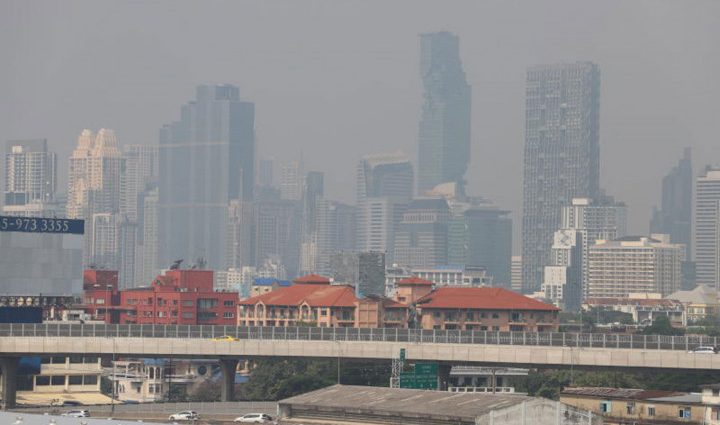Bangkok Yai now worst affected area

Bangkok is facing a critical surge in PM2.5, prompting urgent action from the government.
The levels of fine particulate matter smaller than 2.5 microns in 29 out of 50 districts exceeded 35 microgrammes per cubic metre (μg/m3), indicating the air was unhealthy.
Bangkok Yai district was the worst affected with 105.1 μg/m3, followed by Thonburi (104.8μg/m3), Nong Khaem (103.7μg/m3), Khlong San (100.6μg/m3), and Bang Kho Laem (99.5μg/m3), according to the Geo-Informatics and Space Technology Development Agency (Gistda).
In an interview at the Sustainability Forum 2023 at the Bitec Bangna exhibition hall yesterday, the premier said that he was fully aware of the pollution problem and had arranged a discussion with related sectors regarding control measures.
Even though the state had kicked off its wildfire prevention campaign, he also added that pollution management is still running as the state knew about the issues being intensified.
The government plans to collect taxes from companies which import farm produce, such as corn, from farmers in Myanmar and Laos who burn their farms.
“If one company imports corn from Laos and we know they import from the farmers who set fire to their farmlands after harvesting, we will collect tax from that company. We plan to use the money to support our ‘Stop Wildfire’ project and support farmers who do not burn their farmland after harvesting,” Mr Srettha said.
Regarding the differentiation between the measures in the capital and Chiang Mai, Mr Srettha said that since plantation burning impacted pollution in the Central Region provinces, he had ordered the related officers to take care of this matter as well.
Later in the day, Mr Srettha and Pimphattra Wichaikul, Minister of Industry, investigated the pollution situation at the Ratchaprasong intersection.
The government has been working with the private sector on construction projects and any buildings in the capital that would benefit from having water sprayed on them to help reduce dust in the air, he said.
The industry minister also spoke about the farm burning situation, especially sugarcane burning which takes place before harvesting. That, too, was contributing to air pollution in the capital. The premier said he ordered authorities to prevent such burning.
“The problem of PM2.5 is not only an environmental issue, but it also affects our health and the tourism industry,” Mr Srettha said.
Road traffic is another cause of the rising levels of PM2.5 in Bangkok, he said, adding car owners should take good care of their vehicles and make sure their engines don’t billow black smoke. The government is mulling measures to encourage more use of electric vehicles, he said.
Bangkok governor Chadchart Sittipunt said the Bangkok Metropolitan Administration (BMA) has worked with many agencies on pollution control, such as offering discounts on oil changes for vehicles that have been in use for over seven years. The BMA is also working with the Department of Land Transport to regularly check on fumes emitted from public buses.
“We even thought about working with barbecue restaurants in risk areas so they can have vacuum systems to mitigate small dust in the air,” Mr Chadchart said. The BMA will also tighten its pollution control measures at factories and construction sites, he added.
Gistda records on Wednesday showed that five other provinces were also contending with high levels of PM2.5. Samut Sakhon reported the highest levels of PM2.5, reaching 92.5μg/m3 yesterday, followed by Nakhon Pathom (86.2μg/m3), Rayong (83.1μg/m3), Bangkok (75.8μg/m3), Samut Prakan (75.7μg/m3) and Nonthaburi (71.9μg/m3).
Minister of Natural Resources and Environment, Pol Gen Patcharawat Wongsuwon, said he had ordered the Pollution Control Department to work on tackling the causes of pollution.

